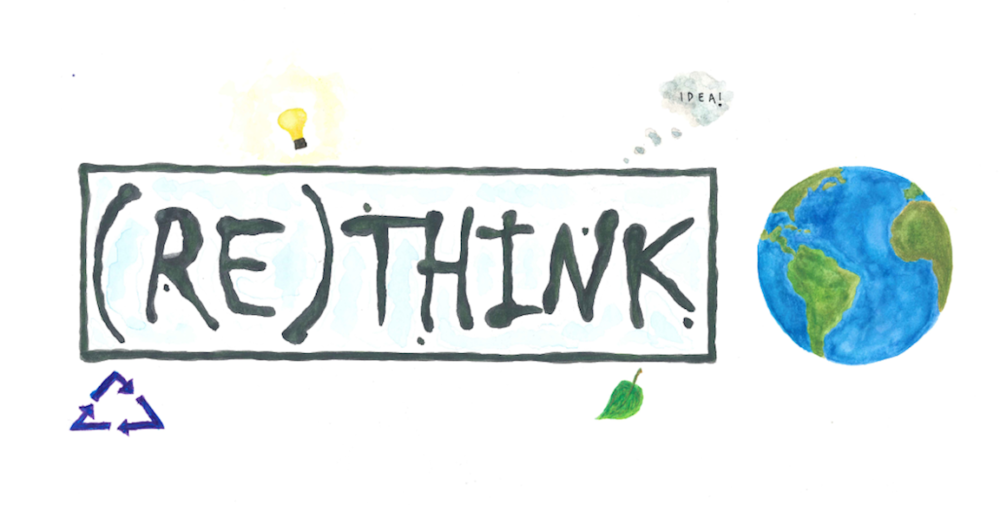Text by Felipe Alexandre de Lima & Jayani Ishara Sudusinghe
Aquarelle by Felipe Alexandre de Lima
It’s worldwide recognized that the current “take-make-dispose” model of production and consumption is unsustainable to the detriment of ecosystems and present and future generations [1].
In the face of this challenge, one may evoke political, scientific, or practical solutions. Policies have been established, scholarly work has been carried out, and new business models have been implemented so far. For instance, the Circular Economy ideal has been proposed and conceived of as an alternative approach to combat environmental issues and to develop a carbon-neutral, resource-efficient, and competitive economy [2].
Apart from these contributions, we advocate an attitude of caring (care, felt in all senses of the word). To do so, the book “Essential Care: An Ethics of Human Nature” by Leonardo Boff was essential to provoke critical reflections in this sense [3].
Whether the present is marked by accelerated onslaughts on nature, leading to the degradation of the Earth’s biodiversity, for example, Boff already claimed that there are chances of salvation. However, a long path must be followed, a path where one needs to change daily and political habits, private and public lives, cultural and spiritual practices. In Boff’s words:
“We are in need of a new paradigm for living together. Such a new paradigm will be based on better relations with the Earth, which will inaugurate a new social pact between peoples, a social pact forged in respect and for the preservation of all that exists and is alive.” (pp. 1-2).
For realizing this new paradigm, one element is paramount: “to care”. According to Boff, “caring is the opposite of neglect and carelessness. To care is more than a mere act; it is rather an attitude. Therefore, it encompasses more than a moment of awareness, of zeal and of devotion. It represents an attitude of activity, of concern, of responsibility and of an affective involvement with the other.” (p. 14).
As an illustration, it’s noteworthy showing La Orquestra de Reciclados de Cateura (here, translated into English as The Recycled Orchestra of Cateura). Despite the challenges young teenagers have faced as dwellers of a poor neighborhood located around the Cateura landfill (Asunción, Paraguay), they have interpreted classical musical works with recycled instruments made from garbage locally collected [4].
To care, in this example, refers to Fabio Chavéz’s attitude as the initiator of the Orchestra: he has not only supported the young people living in precarious conditions and in a state of vulnerability, through music, but also contributed to promoting awareness concerning the ecological aspect, transforming used materials into violins, violas, cellos, guitars, flutes, saxophones, trumpets, and percussion instruments. In the relations among Fabio Chavéz, the young teenagers, and the Cateura community, caring transcends the notion of “providing support” meanwhile expressing a new experience of Being!
Add to this observation Boff’s words: “The other way of being-in-the-world is realized through care. Care is not in opposition to work; rather it gives work a different shade. Through care we do not see nature and everything that exists in nature as objects. Through care the relation is not subject–object, but subject–subject. We experience entities as subjects, as values, as symbols that bear a connection to a foundational Reality. Nature is not mute. It speaks and evokes. It emits messages of grandeur, beauty, complexity and power. The human being can listen and interpret these signals. The human being can put itself close to things, together with things, and feel united to them. The human being does not just exist; it co-exists with everything else. The relationship is not one of establishing domination over; it is rather a relationship of living together. It is not sheer intervention; it is rather interaction and communion.” (pp. 63).
Simply put, caring goes beyond any “act of kindness”. To be sure, otherness, respect, and reciprocity are examples of values that are manifested in The Recycled Orchestra of Cateura.
As the title of this text suggests, it’s time to adopt an ethos that values the planet Earth and all its inhabitants (animals, plants, natural landscapes, and so on). Following Boff’s work, we encourage an attitude based on the ethics of care. This process must encompass a reflexive change in our way of living…
Whether such a transformation doesn’t occur, we’ll repeat the same mistakes from the past. Similar to what Brazilian Paulinho Moska sang, we’re going to throw ourselves where we’ve fallen… all new again! [5]
References
[1] Ellen MacArthur Foundation (EMF). (2013). Towards the circular economy: Economic and business rationale for an accelerated transition. London, the UK: Author.
[2] European Commission. (2019). Report from the commission to the European parliament, the council, the European economic and social committee and the committee of the regions on the implementation of the circular economy action plan. Brussels: Author. Retrieved from https://eur-lex.europa.eu/legal-content/EN/TXT/?qid=1551871195772&uri=CELEX:52019DC0190 (last accessed August 26, 2019).
[3] Boff, L. (2008). Essential Care: An Ethics of Human Nature (1st ed., A. Guilherme, Trans.). Waco, TX: Baylor University Press.
[4] Orquestra de Reciclados de Cateura. (2014). Historial del proyecto. Retrieved from https://www.recycledorchestracateura.com/historial (last accessed September 24, 2019).
[5] Translated excerpt of Paulinho Moska’s Tudo Novo de Novo song.
Jayani and Felipe are ESR fellows and PhD candidates at the University of Kassel.
Jayani holds a Master’s Degree in Supply Chain Management from University of Moratuwa, Sri Lanka. She also worked as an Instructor and a visiting lecturer in the Department of Transport and Logistics, University of Moratuwa Sri Lanka, teaching Sustainable Supply Chain Management.
Felipe holds a Master’s Degree in Business Administration from the University of Fortaleza (Unifor), Brazil, with a focus on the dynamics of food production, marketing, and consumption in Alternative Food Networks (AFNs) located in the Brazilian Semiarid region.

